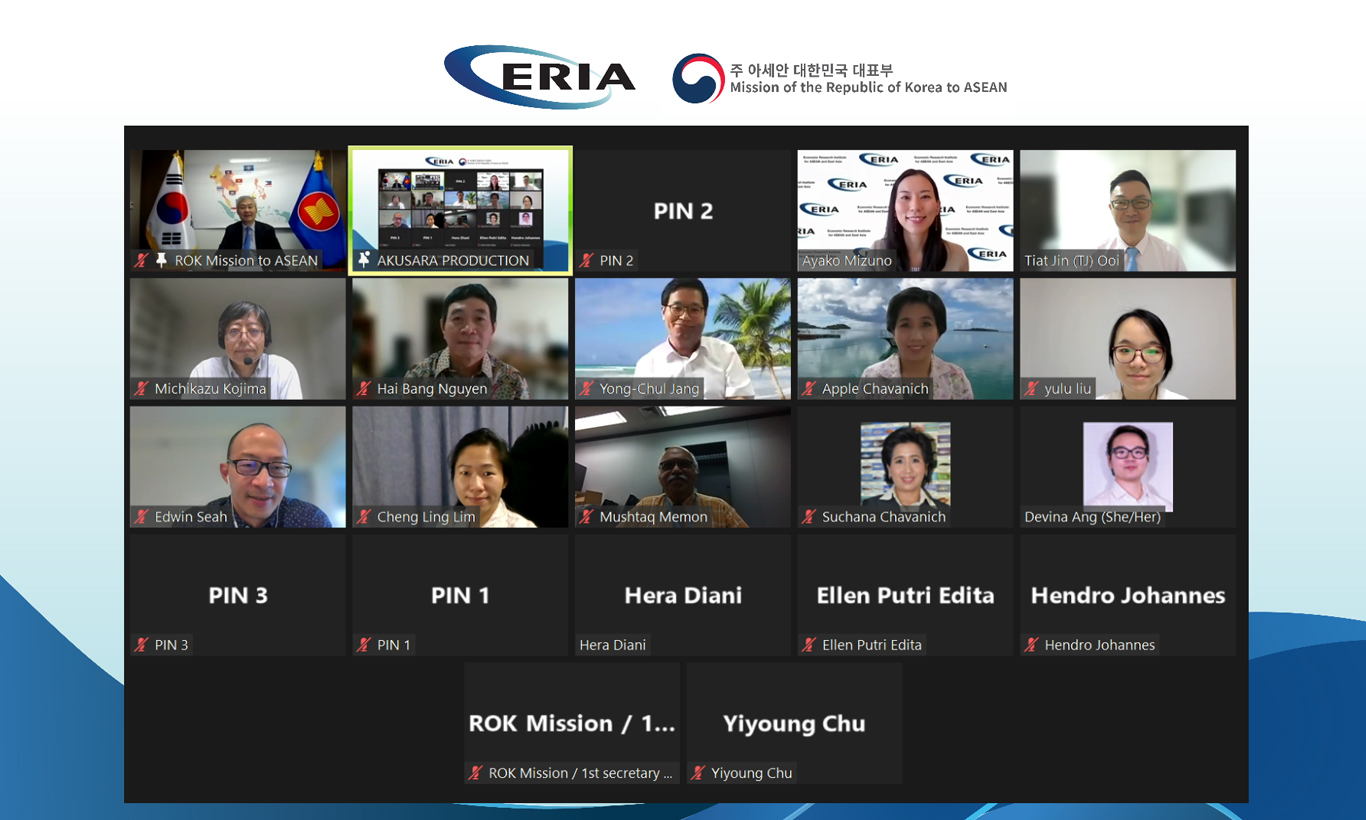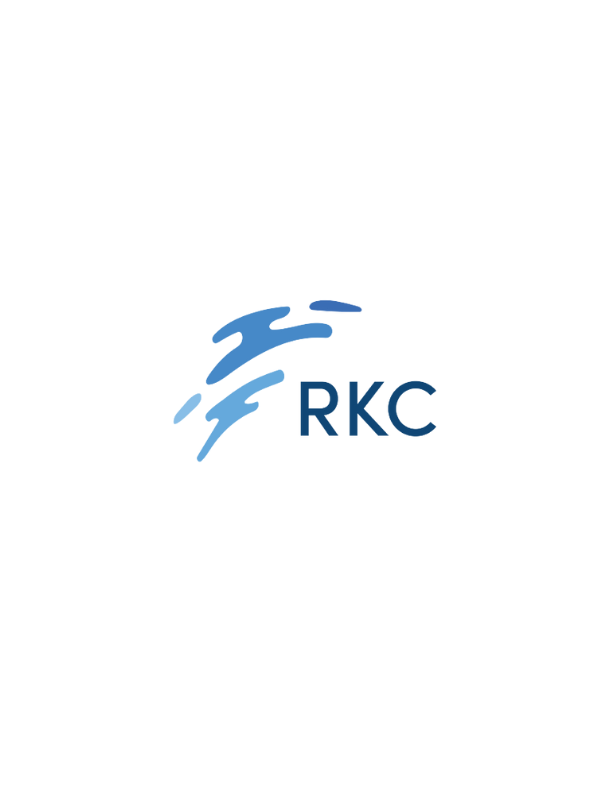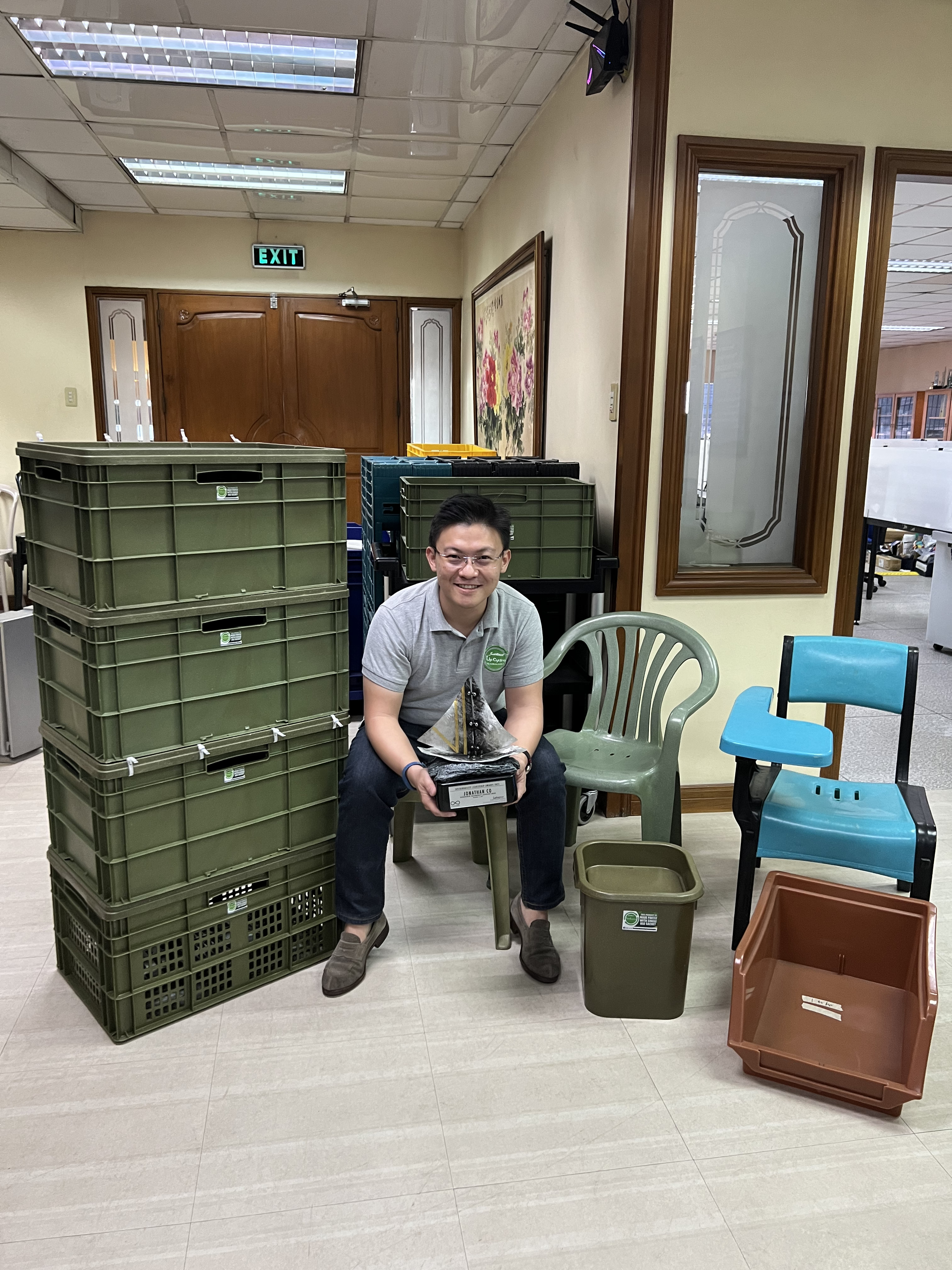

23 June 2022: The Mission of the Republic of Korea to ASEAN, in collaboration with ERIA's Regional Knowledge Centre for Marine Plastic Debris (the Centre), hosted an online forum on ASEAN's marine plastic debris issues to jointly explore the way forward for an international legally binding agreement.
The forum started with opening remarks from H E Ambassador Kwon Hee-seog, the Republic of Korea’s Mission to ASEAN; H E Ambassador Nguyen Hai Bang, Permanent Representation of the Socialist Republic of Viet Nam to ASEAN; and H E Ekkaphab Phanthavong, Deputy Secretary General of ASEAN of the ASEAN Socio-Cultural Community.
‘Marine plastic debris is one of the most eminent threats to humanity. The COVID-19 pandemic also pushed people to consume even more single use plastics [SUP]. For this occasion, we invited many prominent experts from different countries. I hope we can have productive discussions conducive to relevant policy recommendations,’ said H E Ambassador Kwon Hee-seog on his hopes for the forum.
Session one was a stocktaking exercise on regional efforts to tackle marine plastic debris. Dr Suchana Chavanich, Associate Professor at Chulalongkorn University, spoke of the rationale behind the urgent need to address the issue. The impact of plastic waste on the marine ecosystem has been proven through cases of physical entanglements, damage to the digestive tract and nervous system, limiting mobility, and many more.
Also read: Dr Suchana Chavanich’s presentation
Dr Vong Sok, Environment Division Head at the ASEAN Secretariat, said regional agreements to tackle these impacts have been set in place to strengthen cooperation among ASEAN countries, including the ASEAN Framework of Action on Marine Debris, the ASEAN Regional Action Plan for Combating Marine Debris in the ASEAN Member States (2021–2025), and the ASEAN Leader’s Declaration on Blue Economy.
Also read: Dr Vong Sok’s presentation
Mr Joo-Young Park, International Affairs Specialist at the Korea Marine Environment Management Corporation, spoke on joint capacity building projects for monitoring marine debris (on-site training, establishment of monitoring guidelines, pilot-scale monitoring), between Korea and ASEAN countries, including Indonesia (Labuan Bajo), and the Philippines (Manila Bay).
Also read: Mr Joo-Young Park’s presentation
Session two discussed ways to strengthen regional and international cooperation on marine plastic debris. Dr Mushtaq Ahmed Memon, the Regional Coordinator for Resource Efficiency at United Nations Environment Programme, delivered a presentation on how ASEAN can work together for the new United Nations Environment Assembly (UNEA) Resolution.
‘In the SEA Circular Project, we look at how the private sector can be involved in this journey. At the end of the day, we have to take into account that the private sector is concerned about making profits. If we can create opportunities for profit making by reducing plastic pollution, then we can have them on board,’ he said.
Also read: Dr Mushtaq Ahmed Memon’s presentation
Dr Yulu Liu and Ms Cheng Ling Lim, Researchers at the National University of Singapore's Centre for International Law, spoke on policies on restricting single-use plastics (SUP). In their inventory research, they found existing regulations do not focus on all types of SUP, and mechanisms for compliance, monitoring, and enforcement are generally weak. Moreover, consumers are the only focus while other players’ roles should be equally highlighted. Lack of information on return schemes and other economic incentives, as well as lack of research on new interventions and their proper evaluation, are additional factors that hamper effective policymaking.
Also read: Dr Yulu Liu and Ms Cheng Ling Lim’s presentation
Mr Edwin Seah, Advisor at TRIA Pte Ltd Singapore, gave his insights on the implementation of extended producer responsibility (EPR) in ASEAN. He said that although the system has been around in this region for years, its implementation is still very slow.
‘EPR in the EU and US might not be applicable within the context of ASEAN based on three big reasons: high rate of compliance, monitoring, and enforcement. In line with this, the ASEAN governments should not be absolved of their responsibility to provide basic waste management services, similar to defence, education, and the healthcare system being considered their fundamental duties towards their citizens,’ he said.
Also read: Mr Edwin Seah’s presentation
Professor Yong-Chul Jang, from Chungnam National University, gave the final presentation, demonstrating the direction of sustainable plastic waste management and international cooperation between the Korea and ASEAN. He said that in Korea, an EPR system to inject waste back into the economy as sustainable materials has been successfully implemented since 2003. The technical knowledge, adopted policies, and implementation schemes of this successful system can be shared as knowledge transfer and capacity building in ASEAN Member States with high plastic pollution.
Also read: Professor Yong-Chul Jang’s presentation
In the discussion session, the panellists formulated personal policy recommendations, as follows:
Policy shall consider the different scopes of people who are likely to have different behaviour (Dr Chavanich)
To build a robust monitoring system, solid data and information accumulated over a long time is fundamental (Mr Park)
EPR implementation might vary from one country to another (Dr Memon)
Developing countries should focus on infrastructure development; formalisation of the informal waste sector; as well as adopting effective regulations, fiscal measures, and mandates that cut across each other (Mr Seah)
Banning SUP production, recycling targets, and international cooperation schemes are three components to be included in the new treaty (Mr Jang)
In developing countries, more time and capacity building efforts are required to move toward better plastic pollution prevention (Dr Liu and Ms Lim).
Mr Michikazu Kojima, ERIA Senior Advisor, closed the forum by expressing his gratitude toward the co-organiser and esteemed panel members, and by reiterating the significance of collaborative actions under the new international treaty in the fight against plastic pollution.
Read the full report.
23 June 2022: The Mission of the Republic of Korea to ASEAN, in collaboration with ERIA's Regional Knowledge Centre for Marine Plastic Debris (the Centre), hosted an online forum on ASEAN's marine plastic debris issues to jointly explore the way forward for an international legally binding agreement.
The forum started with opening remarks from H E Ambassador Kwon Hee-seog, the Republic of Korea’s Mission to ASEAN; H E Ambassador Nguyen Hai Bang, Permanent Representation of the Socialist Republic of Viet Nam to ASEAN; and H E Ekkaphab Phanthavong, Deputy Secretary General of ASEAN of the ASEAN Socio-Cultural Community.
‘Marine plastic debris is one of the most eminent threats to humanity. The COVID-19 pandemic also pushed people to consume even more single use plastics [SUP]. For this occasion, we invited many prominent experts from different countries. I hope we can have productive discussions conducive to relevant policy recommendations,’ said H E Ambassador Kwon Hee-seog on his hopes for the forum.
Session one was a stocktaking exercise on regional efforts to tackle marine plastic debris. Dr Suchana Chavanich, Associate Professor at Chulalongkorn University, spoke of the rationale behind the urgent need to address the issue. The impact of plastic waste on the marine ecosystem has been proven through cases of physical entanglements, damage to the digestive tract and nervous system, limiting mobility, and many more.
Also read: Dr Suchana Chavanich’s presentation
Dr Vong Sok, Environment Division Head at the ASEAN Secretariat, said regional agreements to tackle these impacts have been set in place to strengthen cooperation among ASEAN countries, including the ASEAN Framework of Action on Marine Debris, the ASEAN Regional Action Plan for Combating Marine Debris in the ASEAN Member States (2021–2025), and the ASEAN Leader’s Declaration on Blue Economy.
Also read: Dr Vong Sok’s presentation
Mr Joo-Young Park, International Affairs Specialist at the Korea Marine Environment Management Corporation, spoke on joint capacity building projects for monitoring marine debris (on-site training, establishment of monitoring guidelines, pilot-scale monitoring), between Korea and ASEAN countries, including Indonesia (Labuan Bajo), and the Philippines (Manila Bay).
Also read: Mr Joo-Young Park’s presentation
Session two discussed ways to strengthen regional and international cooperation on marine plastic debris. Dr Mushtaq Ahmed Memon, the Regional Coordinator for Resource Efficiency at United Nations Environment Programme, delivered a presentation on how ASEAN can work together for the new United Nations Environment Assembly (UNEA) Resolution.
‘In the SEA Circular Project, we look at how the private sector can be involved in this journey. At the end of the day, we have to take into account that the private sector is concerned about making profits. If we can create opportunities for profit making by reducing plastic pollution, then we can have them on board,’ he said.
Also read: Dr Mushtaq Ahmed Memon’s presentation
Dr Yulu Liu and Ms Cheng Ling Lim, Researchers at the National University of Singapore's Centre for International Law, spoke on policies on restricting single-use plastics (SUP). In their inventory research, they found existing regulations do not focus on all types of SUP, and mechanisms for compliance, monitoring, and enforcement are generally weak. Moreover, consumers are the only focus while other players’ roles should be equally highlighted. Lack of information on return schemes and other economic incentives, as well as lack of research on new interventions and their proper evaluation, are additional factors that hamper effective policymaking.
Also read: Dr Yulu Liu and Ms Cheng Ling Lim’s presentation
Mr Edwin Seah, Advisor at TRIA Pte Ltd Singapore, gave his insights on the implementation of extended producer responsibility (EPR) in ASEAN. He said that although the system has been around in this region for years, its implementation is still very slow.
‘EPR in the EU and US might not be applicable within the context of ASEAN based on three big reasons: high rate of compliance, monitoring, and enforcement. In line with this, the ASEAN governments should not be absolved of their responsibility to provide basic waste management services, similar to defence, education, and the healthcare system being considered their fundamental duties towards their citizens,’ he said.
Also read: Mr Edwin Seah’s presentation
Professor Yong-Chul Jang, from Chungnam National University, gave the final presentation, demonstrating the direction of sustainable plastic waste management and international cooperation between the Korea and ASEAN. He said that in Korea, an EPR system to inject waste back into the economy as sustainable materials has been successfully implemented since 2003. The technical knowledge, adopted policies, and implementation schemes of this successful system can be shared as knowledge transfer and capacity building in ASEAN Member States with high plastic pollution.
Also read: Professor Yong-Chul Jang’s presentation
In the discussion session, the panellists formulated personal policy recommendations, as follows:
Policy shall consider the different scopes of people who are likely to have different behaviour (Dr Chavanich)
To build a robust monitoring system, solid data and information accumulated over a long time is fundamental (Mr Park)
EPR implementation might vary from one country to another (Dr Memon)
Developing countries should focus on infrastructure development; formalisation of the informal waste sector; as well as adopting effective regulations, fiscal measures, and mandates that cut across each other (Mr Seah)
Banning SUP production, recycling targets, and international cooperation schemes are three components to be included in the new treaty (Mr Jang)
In developing countries, more time and capacity building efforts are required to move toward better plastic pollution prevention (Dr Liu and Ms Lim).
Mr Michikazu Kojima, ERIA Senior Advisor, closed the forum by expressing his gratitude toward the co-organiser and esteemed panel members, and by reiterating the significance of collaborative actions under the new international treaty in the fight against plastic pollution.
Read the full report.

Communication Desk


